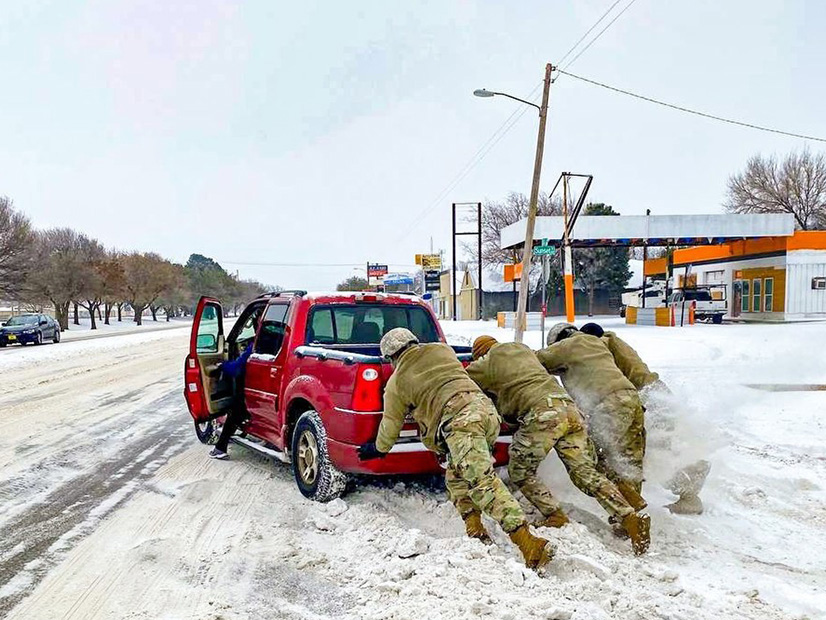
The NERC Standards Committee on Wednesday voted to delay approving the draft standards authorization request (SAR) developed in response to a preliminary joint report with FERC on the catastrophic winter storm events in Texas last February until after the final report is published.
Despite a plea for urgency and an offer to delay publishing the SAR for comment until the report’s publication from Howard Gugel, NERC vice president of engineering and standards, committee members were reluctant to authorize a SAR without more technical information that they said would be in the final report.
The report — which listed nine key recommendations for preventing another near complete collapse like the one experienced by ERCOT — was first presented at FERC’s open meeting last month. And those recommendations were included in the draft SAR that was issued by NERC staff Oct. 6. (See FERC, NERC Share Findings on February Winter Storm.) The final report is expected to be published next month, NERC staff said, but exactly when is unknown.
Gugel, however, told the committee that NERC did not expect any of the recommendations to change and that the final report would only contain more details. He noted that the SAR would have allowed for a 45-day comment period, instead of the usual 30 days, to allow the SAR drafting team to factor in the final report as it also examines comments. It would also allow them to work on their comments before the holiday season. If it had been approved Wednesday, comments would have been due Dec. 4.
“This is a matter of urgency that FERC is concerned about, we’re concerned about, our board is concerned about,” Gugel said. “We know that based on the findings that we have [that] we need to make some changes very quickly. If we don’t act somewhat soon on this, it will be very difficult to get these changes in place within the next two or three winters.
“So we think that it’s important to at least get the SAR out for comment at this point. … If we wait, we’re probably not going to be in a situation where we can address this is any expedient manner.”
But most committee members were unpersuaded by these arguments.
“I think we all know the significance of [the SAR] and the importance of it,” said Terri Pyle, director of utility operational compliance for OGE Energy. “And I also think that’s important to make sure that the SAR is right; that industry has had the opportunity to review the final report and the technical justification prior to accepting the SAR for posting for comment.”
Many other committee members echoed Pyle’s sentiments.
“I have had members reach out to me as well with concerns that we will be basing this SAR on a preliminary report,” said Sarah Snow, manager of reliability compliance at Mississippi-based Cooperative Energy.
Gugel offered to delay posting the SAR, thus delaying the start of the comment period, until the final report was published, though he cautioned the period would need to be shortened to 30 days. But he still urged for the committee not to delay action, as it next meets Nov. 17.
Kiel Lyons — NERC senior manager of grid planning and operations assurance, who is part of the team working on the report — also said that the ERO had published the preliminary report to get the ball rolling on the standards development process. “I don’t want anyone to take away [that] the findings and the recommendations that were presented at the [FERC] open meeting were in any way [premature]. … Those were the fully formed findings and recommendations of the team after the review of all the data. … That’s why we’re comfortable submitting the SAR as is.”
“Waiting until the next meeting may not really provide anything different or bring anything different to that meeting that would help this group make the decision,” said Tony Purgar, senior consultant for ReliabilityFirst. Gugel’s proposed compromise, however, “makes more sense,” he said.
Charles Yeung, executive director of interregional affairs at SPP, also found the compromise fair. “There is value for the members of this committee getting more details about the report.” But “we don’t know how much more technical information might be included in that report, and what technical information people are needing to be comfortable with the SAR.”
But committee members were still unsatisfied. Pyle moved to table the SAR until the committee’s next meeting, but another member pointed out that the report still may not be finished by then. The motion was then changed to say until after the final report’s publication.
The committee approved this by a 16-3 vote. Yeung voted against it, along with consultant Philip Winston and Steven Rueckert, director of standards at WECC.
Other Committee Action
The committee also voted to approve a draft SAR submitted by Tri-State Generation and Transmission Association that proposes to revise FAC-008-5 to enhance the accuracy of facility capability ratings to modify and provide clarification to the term “jointly owned” in the standard.
It also approved the final SAR for Project 2019-04 and the conversion of the SAR drafting team to a standards drafting team, which will commence drafting revisions to PRC-005-6. The project, proposed by the North American Generator Forum, seeks to clarify the applicability of the standard to the protective functions within an automatic voltage regulator.



